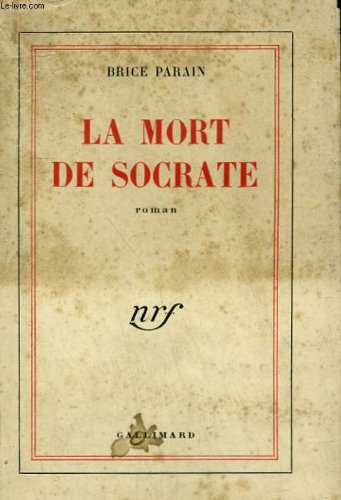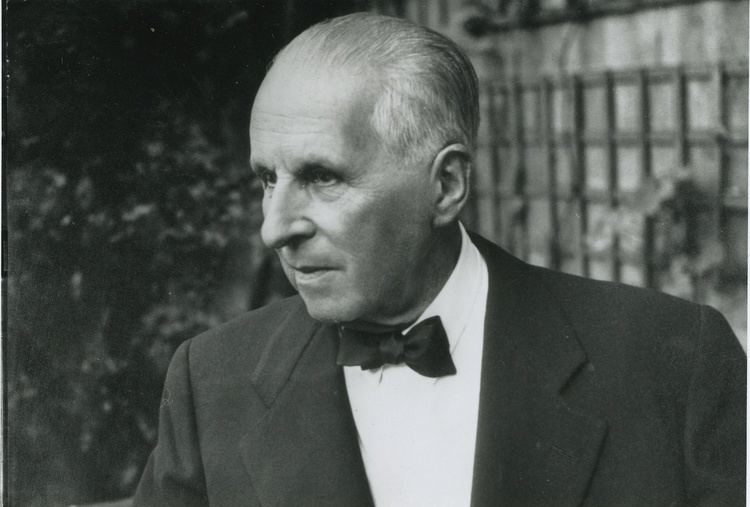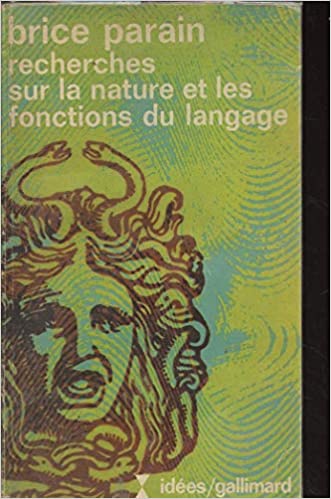In Pursuit of Language: The Life and Work of Brice Parain
Jesse AmarBrice Parain (1897-1971) was a central figure in 20th-century French intellectual life–central, even if now rather obscure. He was a literary polymath: philosopher, novelist, playwright, political essayist, translator, and occasional actor. He made equal contributions to culture from behind the scenes: as a senior editor at Gallimard, he marked in red some of the key literary productions of the century, including–and voilà the impetus for this article’s appearance in Attention–Simone Weil’s L’Enracinement (1949). As the philosophers on staff at Gallimard, it was Parain and Albert Camus (who, incidentally, counted Parain as a major philosophical influence) who handled Weil’s great posthumous manuscript. According to Weil’s biographer Gabriella Fiori, it was probably Parain who titled the book.

There are other, more substantive reasons for a devotee of Weil to peruse Parain’s works. Parain and Weil were both unorthodox thinkers who nevertheless placed a high value on tradition; both proponents of an anti-Communist leftism; both resistant to the atheism of the cultural mainstream (although God plays a very different role in the thought of each). In a 1950 letter, collected in Brice Parain, un homme de parole (2005), Parain’s friend Pierre Leyris expresses a hope that, in the wake of L’Enracinement’s wild and unexpected success, the reading public might be primed to appreciate Parain’s latest effort (La Mort de Socrate, 1950).
But I don’t intend to delve into a comparative study of the two. I leave that to accredited Weilians. My intention here is to offer a short biography, which, I hope, will help contextualize Parain’s thought, and indicate to the interested reader a few possible points of entry into his oeuvre.

Parain was born in 1897 in a small commune of the Seine-et-Marne region, the son of a country schoolmaster. World War I was the major event of his youth, and he served at the front for 18 months. In the aftermath of the war, Parain arrived in Paris as a student of philosophy and Russian at the École normale supérieure. He was accredited in 1923. In 1924 the French government officially recognized the USSR, and the newly exmatriculated Parain was tasked by the Russian Affairs Commission to create a documentation center in Paris. In 1925 he was sent to Moscow as cultural attaché, and he resided there two years. During this time he met and married Nathalie Tchelpanova, who was to become a celebrated illustrator on their return to France; and he worked on his first translations from Russian literature, an activity to which he would repair frequently throughout his career (he has even been called, perhaps hyperbolically, the “inventor of Russian literature in French”). On his return to Paris he was hired by the publishing firm NRF/Gallimard, as secretary to Gaston Gallimard. His role at the press rapidly expanded and diversified: he was editor, manager, reviewer, translator, and author.

In 1929 he joined the Communist party, but found himself taken aback by the dogmatism and mauvaise foi he witnessed there. He had, of course, a much better sense of conditions in the USSR than many of his comrades, and he was better prepared to recognize the brutality of the Stalin regime. Indeed, he abandoned Communism long before the tide of international left-wing opinion turned against it: his definitive break with the party came in 1933.
Parain’s intellectual trajectory

These two youthful experiences–his time at the front and his flirtation with Communism–were bitter ones, but generative. The distrust he gleaned from them, of ideology, nationalism, and officialese, set not only his political, but his philosophical outlook. On the political front, two book-length essays–Essai sur la misère humaine (1934) and Retour à la France (1936)–document the impact of this period on Parain’s intellectual trajectory, besides being original and important works of political thought. They set the tone, too, for two decades of polemical warfare waged by and against Parain in shorter formats. Several of Parain’s essays contra Communism can be found in L’embarras du choix (1946) and in Brice Parain, un homme de parole. Another interesting read is a long and contemptuous review of Parain’s work by Sartre (“Aller et retour,” 1944), which is available in English (in Literary and philosophical essays, 1955): their political differences (Sartre was among the last leftist intellectuals to abandon Communism, as Parain was among the first) form the background for this veiled attack, as does, perhaps, some personal antipathy relating to cuts Parain made as editor of Sartre’s seminal novel La Nausée.
Politics bristles beneath the surface of Parain’s philosophical work too. In his first two treatises – Essai sur le logos platonicien (1941), and Recherches sur la nature et les fonctions du langage (1943) – Parain studies the foundations of language, a “transcendent” and “external” (not to say “alien” and “hostile”) system which is ambiguously grounded in human experience:
That language is a being exterior to us, although it seems at first glance only a manifestation of our existence, is what is shown already by the form in which it appears to us when it dons its solemn visage, the book; that is to say, an object like a house or a tree, as foreign to its readers and writer as those are to the man who built or planted them. . . .
(Recherches, 15-16; my translation)
Some external guarantee of truth

Parain is half-Platonic here, and perhaps resists a major premise of modern linguistics, the arbitrary nature of the sign. By emphasizing language’s transcendence, Parain expresses an ambiguous hope for some external guarantee of truth, honesty, authenticity; ultimately, of ethical action. Not that he naively asserts this guarantee to be an established fact; but he resists what he perceives as the major trend in philosophy, towards a refurbished, gussied-up nominalism which begins by asserting that language is a wholly human and ad hoc invention, and ends in moral relativism:
Will we say, like Hegel, that the universal [sign] is a residue of the diverse significations attributed by each person to the same word and which cancel each other out–the now no longer day nor night, the here no longer house nor tree?That would be to reduce the meaning of the words to nothing. Such indeed is the result of expressionism [in Parain’s terminology, a set of solipsistic theories about language]. The result is that that doctrine is never satisfied and cannot be. Language always seems to it true, because it expresses the individual, and false because it does not express him. In effect, if I inspect the words I utter solely from my own interior inconstancy, they cannot appear to me, or only as flatus vocis [mere breath], light, haphazard gestures. . .
(Recherches, 225-6; my translation)

What Parain seeks, in investigating this kind of semantic rootlessness, is to uncover one source of our moral rootlessness. Camus put this beautifully in his 1944 essay “Sur une philosophie de l’expression,” available in English in the collection Lyrical and critical essays (1968):
For Parain’s basic premise is that if language is meaningless then everything is meaningless, and the world becomes absurd. We know only by means of words. If they are proved useless, then we are finally and irredeemably blinded. (230)
The period of World War II tested Parain’s own moral mettle, and though not an active member of the Resistance, he displayed considerable courage. In 1942 he barely escaped prosecution by the Vichy government after being caught in the act of buying fake passports for two Jewish friends. In 1944 he sheltered Camus in his house at Verdelot for several weeks, as the latter fled the authorities.
After the war his literary output diversified. He tried his hand at fiction, though he approached his novels as a philosopher and moralist, rather than “for art’s sake”: “The role of [a] novel is to verify in a concrete case whether [a] doctrine is true, whether it is applicable.” (Entretiens avec Bernard Pingaud, 1966, 146; my translation)

He attained his best result, perhaps, with Joseph (1964) a short novel about a marital crisis, which is more engaging and perceptive, I think, than the pragmatic definition above would suggest. Other important works from this period include a lightly fictionalized memoir, De fil en aiguille (1960) and a set of Entretiens avec Bernard Pingaud, broadcast on the radio in 1964 and published under that title in 1966. Two years before his death, Parain published the Petite métaphysique de la parole (1969), a genre-defying summation of his thought which is also the only of his books available in English (A metaphysics of language, 1971).
The allure of silence
I would be remiss if I did not mention the importance of silence in Parain’s work. Silence is the converse of language in several ways: its precursor, in the sense that we acquire language only gradually, after years of silence; its dialectical partner, in the sense that through work, meditation, observation of nature, all fundamentally silent activities, we preserve our connection to the “things themselves,” which language is meant to express. Silence is also death, or has become death. The following passage suggests all these valences:

Man is born not much different than a baby rabbit. Twenty years later he writes a book, assassinates a czar, becomes a monk, he hangs himself or marries. […] Eventually, life cedes its power to language. One must learn to speak. Between a swallow and myself, the difference was my schooling and its consequences: an invention, an execution, suicide or a family. How do I picture to myself that it’s me who wanted it? And why? From ambition? The poets caution me against that. Myself, I felt that I was being forced. I saw myself dragged towards a kind of catastrophe, which really occurred, furthermore, in the form of the war. Nothing could better conclude an apprenticeship in Greek and mathematics, Thucydides and descriptive geometry, than the mobilization, the invectives, combat, killing and being killed.
All at once the mute astonishment of a child torn between the countryside and his studies became the universal drama: young men, running, exhausted, falling in combat; and the journalists who told the story. Where was the truth? In dying, or in speaking? The choice was inhuman.
(Petite métaphysique de la parole, 16-17; my translation)
Two important films
“Life cedes its power to language.” At a certain point in childhood, our world of mute, and immediate experience must be objectified by language: what we wish to express must enter into a system of rules which is accessible to all, but by the same token external to each. Parain strengthens the sense of externality by invoking mathematics and Greek, systems of signification that resist the solipsism of “expressionism,” the one by belonging to the world rather than to us, the other by belonging to the dead. The dialectic, then, between silence and language, is already disturbed, unbalanced, in the experience of the schoolboy Parain–“torn” between silence and language, he feels he is pulled too much towards the latter pole. And how catastrophically this feeling is justified, when, in the experience of trench-warfare, silence becomes nothing but a sickness unto death; while language, in the form of journalism, policy, iand deology, glides cynically overhead, twisting everything to its own ends.
Perhaps it is owing to this meditation on silence that Parain’s influence on film almost outweighs his influence on literature, though the latter was his own métier. In a film, not only the words, but the silences between them are eloquent–the two are dialectical partners, as they should be. Two films in particular, both of them classics of the French New Wave, bear the mark of Parain’s thought: Rohmer’s Ma nuit chez Maud (1969), for which much of the dialogue is modeled on Parain’s ideas; and Jean-Luc Godard’s Vivre sa vie (1962), in which Parain acted a scene. In what is, at least for me, the key passage of the film, the protagonist, ill-starred prostitute Nana (Anna Karina)) wanders into a café, where she meets an errant philosopher (Parain). Their impromptu conversation encompasses, perhaps better than I have here, the key themes of Parain’s philosophy: the difficulty of communication, the possible groundlessness of language, the allure of silence.
Related
- Brice Parain, A metaphysics of language (1971)
- Febvre Lucien, “Recherches sur la Nature et la Fonction du Langage” (“Research on the Nature and Function of Language”), Annales (1944) no. 6 p. 123.
- Vivien Matisson, “Albert Camus et Brice Parain : de la manipulation du logos,” Les Lettres Romanes, vol. 73, nos. 1-2.
About the author

Jesse Amar is a Ph.D. student in Classical Studies at the University of Pennsylvania. He is also the author of “Indulgence towards Lies:” Reintroducing the Philosopher Brice Parain,” Contemporary French and Francophone Studies, vol. 24, no. 5 (2020), and “Lucian’s Imagines: A Student Reader, and Pro Imaginibus: a Translation,” UCONN (2018).
5 Recommendations
